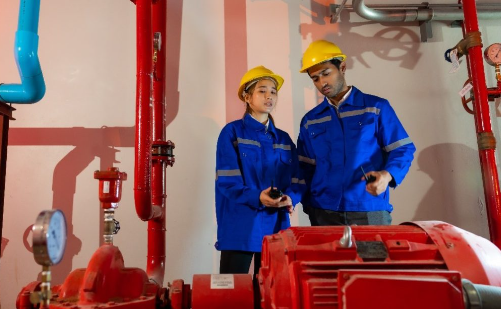The Importance of Regular Fire Protection System Maintenance and Inspection

In the realm of forensic engineering, where the investigation and analysis of failures play a pivotal role, the significance of fire protection systems cannot be overstated. These systems serve as the first line of defense against the devastating consequences of fires, safeguarding lives, property, and critical infrastructure. However, their effectiveness heavily relies on regular maintenance and inspection. In this discourse, we delve into the importance of proactive upkeep of fire protection systems and its implications in forensic engineering practices.
Understanding Fire Protection Systems:
Fire protection systems encompass an array of technologies designed to detect, control, and extinguish fires swiftly and effectively. These systems often include fire alarms, sprinkler systems, fire extinguishers, smoke detectors, and emergency lighting. Each component plays a vital role in early fire detection, alarm activation, and suppression, thereby mitigating potential damages.
The Importance of Maintenance:
Regular maintenance of fire protection systems is paramount to ensure their optimal functionality. Over time, components may degrade due to environmental factors, corrosion, mechanical wear, or system malfunctions. Without proper maintenance, these systems may become unreliable, leading to false alarms, malfunction during emergencies, or complete failure when needed the most.
1. Ensuring Reliability:
Forensic engineering studies often reveal that neglected fire protection services are a common factor in the escalation of fire-related incidents. Regular maintenance helps identify and rectify issues promptly, ensuring that the system remains reliable and operational at all times. By conducting scheduled inspections and tests, potential deficiencies can be addressed proactively, preventing catastrophic failures.
2. Compliance with Regulations:
Adherence to regulatory standards and codes is imperative in forensic engineering, particularly in determining liability and assessing the root causes of fire incidents. Fire protection systems are subject to stringent regulations and standards, mandating regular inspections, testing, and maintenance. Compliance not only mitigates legal risks but also enhances the system’s effectiveness in safeguarding occupants and property.
Read more Breaking Limits: Harnessing Myostatin Inhibition for Strength and Size
3. Extending System Lifespan:
Investing in regular maintenance prolongs the lifespan of fire protection systems, optimizing their performance and efficiency. Forensic engineers often encounter cases where the lack of maintenance accelerates system degradation, resulting in premature failures or inadequate protection. By implementing a comprehensive maintenance plan, stakeholders can maximize the return on investment and minimize lifecycle costs associated with system replacements or repairs.
4. Early Detection of Deficiencies:
In forensic engineering investigations, early detection of system deficiencies is instrumental in preventing catastrophic consequences. Routine maintenance facilitates the identification of potential issues such as damaged components, impaired water flow, obstructed detection devices, or electrical faults. Addressing these deficiencies promptly mitigates the risk of system failure and enhances its resilience in the event of a fire emergency.
5. Enhanced Fire Safety:
The primary objective of fire protection systems is to safeguard life and property against the destructive force of fires. In forensic engineering evaluations, the effectiveness of these systems in containing and suppressing fires significantly influences the outcome of investigations. Regular maintenance ensures that fire protection systems remain in optimal condition, providing reliable detection, early warning, and swift suppression capabilities when needed.
Conclusion:
In the realm of forensic engineering, where the analysis of fire-related incidents is paramount, the importance of regular maintenance and inspection of fire protection systems cannot be overstated. By prioritizing proactive upkeep, stakeholders can enhance the reliability, compliance, and effectiveness of these critical systems. As guardians of life and property, maintaining fire protection systems is not just a legal obligation but a moral imperative in ensuring the safety and resilience of communities worldwide.





